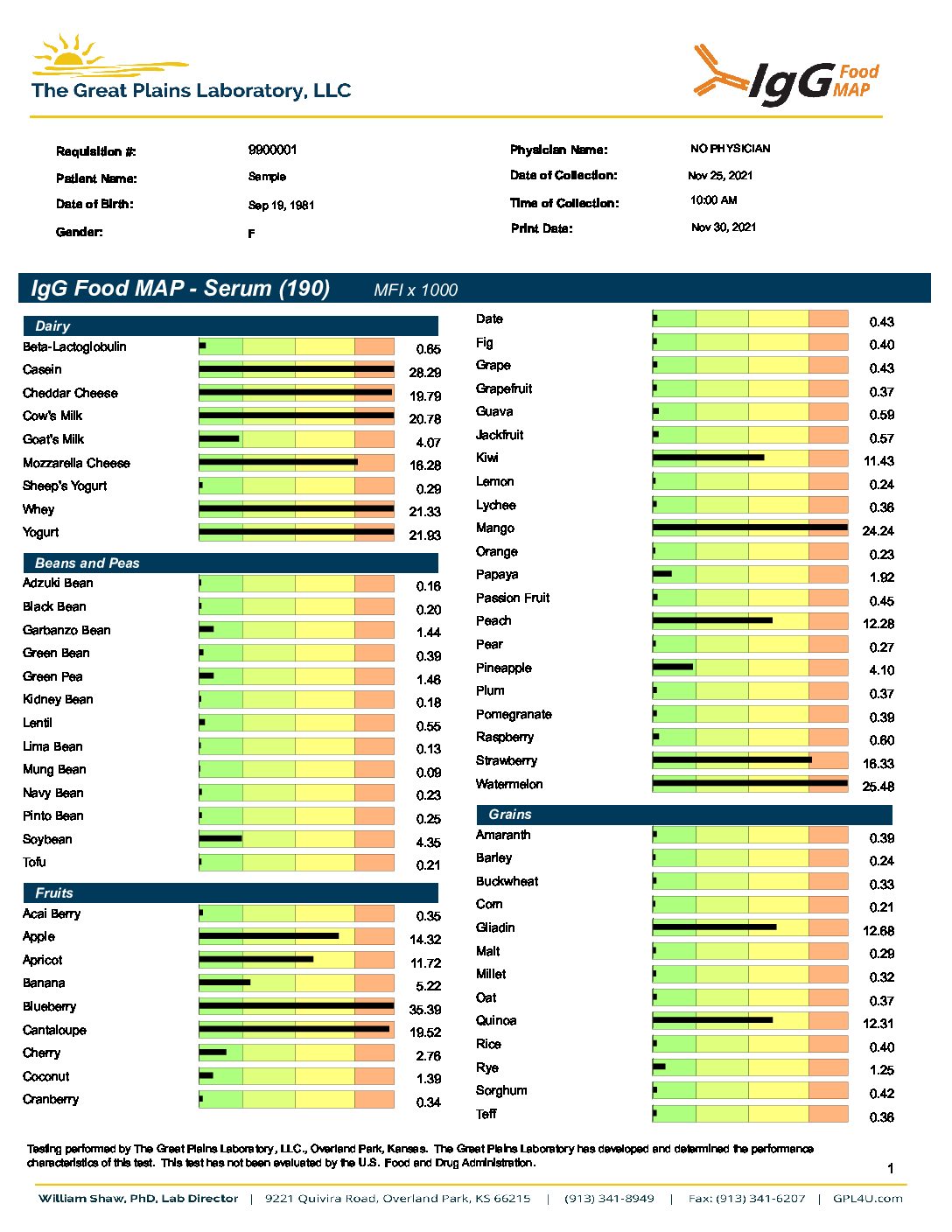Description
Test specimen: Dried blood spot from a finger stick.
Test Analytes: See below for 190 Foods list.
WHY TEST IGG SENSITIVITIES?
Immunoglobulin G (IgG) food testing is a useful guide for structuring elimination diets for patients with many chronic conditions. Individuals with neurological, gastrointestinal, movement, and behavioral disorders often suffer from IgG food sensitivities. People may continue to eat offending foods unaware of their potential adverse effects. Symptoms associated with food sensitivities may occur hours or days after the offending food was eaten because IgG food antibodies remain for a much longer time than IgE antibodies. IgE food allergy causes the release of histamine, producing an immediate hypersensitivity reaction. In contrast, IgG food sensitivity is triggered by the binding of complement to IgG food antigen complexes, causing an inflammatory response. This is a delayed hypersensitivity reaction in which symptoms appear anywhere from hours to days after eating the offending food. Elimination of IgG-positive foods may improve symptoms of irritable bowel syndrome, autism, AD(H)D, cystic fibrosis, rheumatoid arthritis, and epilepsy, according to numerous clinical studies.
THE IGG AND CANDIDA CONNECTION
The Great Plains Laboratory tests for Candida albicans (a microscopic fungal organism and pathogenic yeast) as part of IgG food allergy testing. High levels of IgG antibodies to Candida have been found in patients who reported many symptoms of yeast overgrowth. Candida problems are caused when the benign yeast form of Candida albicans transforms to its fungal form and produces a buildup of toxins in the body. Candida can overgrow areas of the intestinal mucosa resulting in numerous symptoms, including creating microscopic holes in the lining of the intestines, leading to what is commonly known as “leaky gut” syndrome. Candida albicans proteins may trigger an inflammatory response. A wide range of disorders have been linked to Candida overgrowth including autism, multiple sclerosis, depression, chronic fatigue, fibromyalgia, migraines, and irritable bowel syndrome. Immunocompromised patients with cancer or AIDS can have life-threatening complications if Candida enters the bloodstream, resulting in systemic candidiasis. Use of antibiotics, oral contraceptives, chemotherapy, anti-inflammatory steroids, and diets high in sugar and starch increase susceptibility to Candida overgrowth.
Research has revealed a relationship between health of the gastrointestinal tract and overall well-being. Imbalance between good and bad bacteria (dysbiosis) has been shown to worsen behavior disorders, hyperactivity, aggression, and cause fatigue. Evidence is mounting that dysbiosis impairs the immune system and contributes to food allergies, digestive disorders, nutritional deficiencies, and cognitive dysfunction.
THE BENEFITS OF TESTING
IgG testing determines if food reactions are contributing to physical or mental symptoms, and much more quickly than eliminating and then reintroducing each suspect food one-by-one over a period of time.
Removal of highly reactive foods from the diet is a non-invasive therapy that often mitigates a patient’s symptoms.
Research and clinical studies suggest food allergies identified by IgG testing can be major contributing factors to many chronic health conditions.
Eliminating all identified IgG-positive foods after testing can reduce stress on the immune system, decrease inflammation (helping to heal “leaky gut”), resolve food cravings, and reduce the potential for eating disorders.
ANALYTE LIST (190 FOODS + CANDIDA & SACCHAROMYCES CEREVISIAE)
DAIRY
Beta-Lactoglobulin
Casein
Cheddar Cheese
Cow’s Milk
Goat’s Milk
Mozzarella Cheese
Sheep’s Yogurt
Whey
Yogurt
BEANS AND PEAS
Adzuki Bean
Black Bean
Garbanzo Bean
Green Bean
Green Pea
Kidney Bean
Lentil
Lima Bean
Mung Bean
Navy Bean
Pinto Bean
Soybean
Tofu
FRUITS
Acai Berry
Apple
Apricot
Banana
Blueberry
Cantaloupe
Cherry
Coconut
Cranberry
Date
Grape
Grapefruit
Guava
Jackfruit
Kiwi
Lemon
Lychee
Mango
Orange
Papaya
Passion Fruit
Peach
Pear
Pineapple
Plum
Pomegranate
Raspberry
Strawberry
Watermelon
GRAINS
Amaranth
Barley
Buckwheat
Corn
Gliadin
Malt
Millet
Oat
Quinoa
Rice
Rye
Sorghum
Teff
Wheat Gluten
Whole Wheat
FISH/SEAFOOD
Abalone
Anchovy
Bass
Bonito
Codfish
Crab
Halibut
Lobster
Mackerel Saba
Octopus
Oyster
Pacific Mackerel (Saba)
Pacific Saury
Perch
Red Snapper
Salmon
Sardine
Scallop
Shrimp
Small Clam
Squid
Tilapia
Trout
Tuna
MEAT/FOWL
Beef
Chicken
Duck
Egg White
Egg Yolk
Goose
Lamb
Pork
Turkey
NUTS/SEEDS
Almond
Brazil Nut
Cashew
Chestnut
Chia Seed
Flax Seed
Hazelnut
Hemp Seed
Macadamia Nut
Peanut
Pecan
Pine Nut
Pistachio
Pumpkin Seed
Sesame Seed
Sunflower Seed
Walnut
VEGETABLES
Artichoke
Asparagus
Avocado
Bamboo Shoot
Bean Sprout
Beet
Bell Pepper
Bitter Gourd
Broccoli
Brussel Sprout
Burdock Root
Cabbage
Carrot
Cauliflower
Celery
Chili Pepper
Cucumber
Eggplant
Enoki Mushroom
Garlic
Kale
Leek
Lettuce
Lotus Root
Napa Cabbage
Olive (Green)
Onion
Portabella Mushroom
Potato
Pumpkin
Radish
Seaweed Kombu Kelp
Seaweed Nori
Seaweed Wakame
Shitake Mushroom
Spinach
Sweet Potato
Tomato
Yam
Yellow Squash
Yuca
Zucchini
HERBS/SPICES
Basil
Bay Leaf
Black Pepper
Cayenne Pepper
Cilantro
Cinnamon
Cloves
Cumin
Curry
Dill
Ginger
Hops
Mint
Miso
Mustard Seed
Oregano
Paprika
Rosemary
Sage
Tarragon
Thyme
Turmeric
Vanilla Bean
MISCELLANEOUS
Bromelain
Cane Sugar
Cocoa Bean
Coffee
Green Tea
Honey
Meat glue
Oolong Tea



